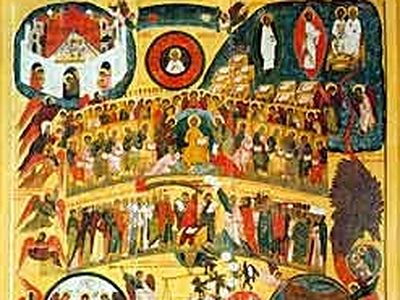Go to the ant, thou sluggard; consider her ways, and be wise: Which having no guide, overseer, or ruler, Provideth her meat in the summer, and gathereth her food in the harvest. How long wilt thou sleep, O sluggard? when wilt thou arise out of thy sleep? Yet a little sleep, a little slumber, a little folding of the hands to sleep: So shall thy poverty come as one that travelleth, and thy want as an armed man (Prov. 6:6-11).
Archimandrite Markell (Pavuk), spiritual father of the Kiev spiritual academies, speaks on the main reason for laziness.
—Father, where does laziness come from? And what will happen if we don’t fight against it?
—“Modern laziness” is the most common characteristic of people living in comfortable city conditions: they don’t have to, for example, go outside to get water, they don’t need to chop firewood, or to heat the oven in order to heat the room. But in village conditions, if you don’t go for water, don’t chop the firewood, and don’t kindle the oven, you will stay hungry and frozen.
In the village labor is an important necessity. To be lazy is to go cold, without food. Our laziness is a result of comfort.
—What should we do, batiushka? Should we reject the good things of civilization?
—For modern man to abandon these benefits is not easy. Civilization has subdued us. Someone might try to leave it, for example, to a distant monastery, somewhere in the Carpathian Mountains or in the Caucasus, but such people who compel themselves to such labor, fleeing from comfort, are few.
—How can we struggle against other’s laziness?
—A loving and responsible person avoids laziness. He always worries that if he doesn’t do something others will suffer from it.
Laziness almost never visits that house where there are many children. There each member of the family always has many responsibilities with no time to relax. Cooking, laundry, cleaning, work in the garden, and so on—almost every member of the family is constantly busy with these things, except for the very youngest, and no one can refuse these responsibilities. But in small families, where there is one child, or none, it’s hard to avoid being lazy.
By the way, the desire for a carefree, comfortable life is one of the reasons for having few children. And it, in its turn, leads to the disappearance of responsibility, for there’s nothing to worry about, no one to care for, and then—laziness.
—Our time is one of optimization—we do less work with greater results. Today every mind is working in this direction.
—Yes, the modern comforts of life help to solve many problems with a minimal exertion of effort and energy. It’s expected that people will become happier and more loving and devote more attention to others.
—But the opposite happens. Why?
—Because it’s impossible to defeat with the help of technological advancements the selfishness, egotism, individualism and other passions that live in every person. What man was by nature and character in the fourth century, so he remains in the twenty-first. Perhaps his mentality has changed a bit. It’s not computers and machines that can change his internal state, but the grace of God, given fully only in the Sacraments of the Church. Because many people disregard the Church, unsolvable problems emerge. It’s one of these problems, accruing like a snowball, that we’re talking about.
—What to do?
—A person who wants to overcome his laziness, preferably at least a little, as far as his responsibilities allow him, should partake in the experience of the monastic life. From the most ancient of times people have sought consolation precisely in monasteries, and to get there have overcame paths of thousands of kilometers. Pilgrims have the saying “the tongue leads to Kiev.”[1]
The monastic rhythm of life itself is not disposed towards laziness. Here pilgrims, besides venerating the blessed relics of the saints, learn self-management. In any monastery there is a clear daily order which has not changed for ages. It includes the obligatory services—the Midnight Office, the Hours, Liturgy, Vespers, trapeza and time for obediences and rest… Everything is cyclical.
All people living in the world can to some extent imitate the monastic order and try to clearly organize their day, and think about when to work, when to pray, when to rest. It will thus become much easier to combat your laziness. As captured in history, people lived this way in the good ol’ days, trying in everything to emulate the monastics. It’s no accident that our country seems to visiting foreigners as one great monastery.
—Why is self-management so difficult on our own, but easier in a monastery?
—I myself would, for example, not go to church out of laziness, but look—the brothers go. You feel ashamed if you miss a Divine service, not because the abbot scolds you, but before the brothers. In a monastery, as in a big family, everything is inter-connected. If you don’t go to a service, then someone will have to take out the particles for you, read the commemoration lists, the choir singing will suffer from your absence on the kliros (if you chant in the choir) and it will affect the mood of all those serving and praying. You see how everyone has such a great responsibility in monasteries. Here you constantly feel a sense of duty with no time to be lazy. The monastery brethren try to support one another all the time.
It should be the same in a family: the feeling of responsibility, mutual support, bearing one another’s weaknesses. If such an attitude is missing then the spouses only look at who owes what to whom, who’s obliged, who did more. And, in the end, the marriage is destroyed.
We must overcome laziness as soon as the symptoms appear. One of them is despondency. Despondency, as we have said before, fights against prayer, fasting, and labor, but if you have this combination then your home will be filled with joy.
—Batiushka, we have received really no new advice. We always return to prayer and fasting.
—The problem is only in that we don’t always understand how real prayer and true fasting should be. We often excessively begrudge and fear that if we give more time to prayer then we won’t manage to get something else done. But it’s a snare…




